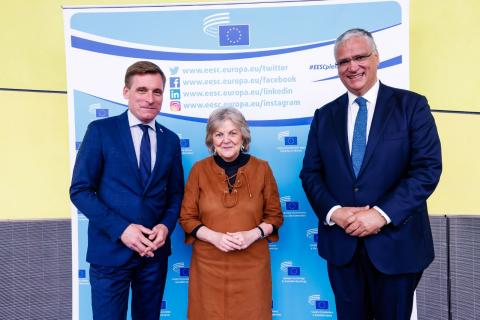European Economic
and Social Committee
EESC President
EESC President
Strong and inclusive cohesion policy is key to a successful EU enlargement
The European Economic and Social Committee (EESC) has adopted two opinions at its May plenary, emphasising the crucial role of cohesion policy – the EU’s primary funding instrument for regional development – in future enlargements. The EESC calls for, among others, compliance tools to be included in accession treaties to address potential post-accession challenges, such as emigration and rule of law concerns.
EESC's new set of recommendations The role of cohesion policy in upcoming rounds of EU enlargement and the Ninth report on economic, social and territorial cohesion focuses on integrating and empowering civil society organisations (CSOs) to effectively make use of cohesion funds. The Committee underlines that the success of cohesion policy should be measured not only by economic investments in a given area, but also by territorial and social outcomes. Moreover, in order to achieve social, economic and territorial cohesion, the capacity of public administrations must first be strengthened.
The discussions, which included input from Commissioner for Cohesion and Reforms, Elisa Ferreira, and President of the European Committee of the Regions (CoR), Vasco Alves Cordeiro, echoed the Commission’s recent 9th Cohesion Report, stressing the importance of pre-accession aid.
EESC President Oliver Röpke stressed that ‘cohesion policy is essential for addressing the challenges of EU enlargement, allowing civil society partners to engage and benefit from it. The EESC’s Enlargement Candidate Members Initiative has enabled Albania and Montenegro to contribute to the Committee's opinions. Their message was clear: civil society organisations need to be more empowered to use cohesion funds effectively’.
Commissioner for Cohesion and Reforms, Elisa Ferreira: ‘We are in strong agreement that cohesion policy needs to remain a pillar of EU integration. It boosts competitiveness and convergence across the EU while empowering local communities. Its benefits flow to all European regions. A strong cohesion policy is necessary to cope with the many internal and external challenges Europe faces. Without cohesion we risk a fragmented EU, a dysfunctional single market, and the rise of a geography of discontent.’
‘Europe has never needed a stronger cohesion policy. We need to put economic, social and territorial cohesion at the top of the EU political agenda’, added CoR President Vasco Alves Cordeiro. ‘A bolder and reformed cohesion policy for post-2027 as the main EU investment tool for all regions is the only solution for the many challenges Europe is facing. We need to join forces and mobilise to prevent a centralised and ‘one size fits all’ approach to become reality.’
Tailoring aid and strategic policies
EU cohesion policy contributes to strengthening economic, social and territorial cohesion in the European Union. It helps to ensure there are no gaps between countries and between different areas and regions.
‘Cohesion policy and pre-accession aid is crucial for peace and prosperity in unstable regions. Aid should be tailored to the specific needs of candidate regions and neighbouring EU Member States’, explained EESC rapporteur María del Carmen Barrera Chamorro.
Key EESC recommendations found in opinion The role of cohesion policy in upcoming rounds of EU enlargement include:
- strengthening education and social integration in candidate states;
- involving CSOs in aid planning and implementation processes;
- focusing on capacity building and going beyond core investments to protect vulnerable populations;
- using special mechanisms other than pre-accession aid for countries like Ukraine;
- including compliance tools in accession treaties to prevent post-accession issues, such as emigration and rule of law concerns.
Impact on current Member States
The EESC highlights the broader impacts of enlargement on current Member States, particularly those bordering candidate countries. This requires additional funds for regions affected by changes in value chains and labour migration. The Granada Declaration reaffirms the importance of cohesion policy for EU enlargement, stressing peace, prosperity and security, while also calling for respect for the EU acquis, adequate funding for social partners and necessary institutional reforms.
Adaptation to new challenges
With the Ninth report on economic, social and territorial cohesion opinion, by rapporteur Matteo Carlo Borsani, the EESC addresses the need to adapt cohesion policy to new challenges, ensuring social, economic and territorial cohesion across an expanding EU.
Recommendations include:
- investing in SMEs and large companies to enhance productivity and GDP growth;
- developing policies that have broad regional impacts;
- creating policies that ensure fair employment access, especially for vulnerable groups;
- enhancing local and regional administrations and involving social partners in programme implementation;
- supporting a robust multiannual financial framework for future EU investments;
- facilitating access to green and digital tools with simple investment mechanisms to ensure uniform capacities across Member States.
‘A dynamic cohesion policy is crucial for unlocking the EU’s economic potential, particularly in less developed areas, and for preparing for future enlargements. This will ensure new Member States are integrated effectively without compromising current investments’, commented Borsani.
Work organisation
Downloads
Contact
Oliver Röpke European Economic and Social Committee rue Belliard/Belliardstraat99-101 1040 Brussels Belgium
Tel (secretariat): +32 (0)2 546 99 32
Email (secretariat)
Media Contact
For press and media inquiries, please contact the President's SpokespersonFor photos of the President, please consult the EESC Media Library
